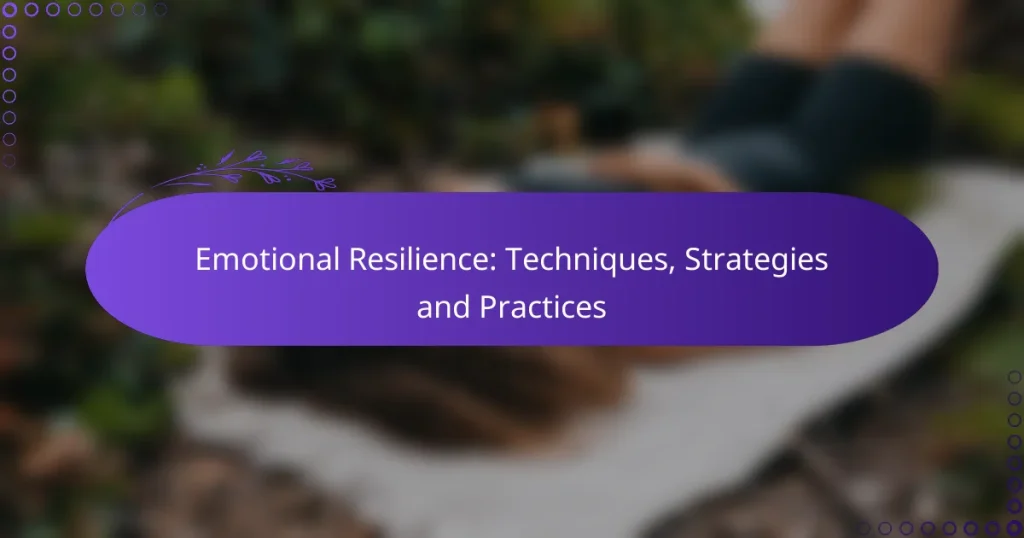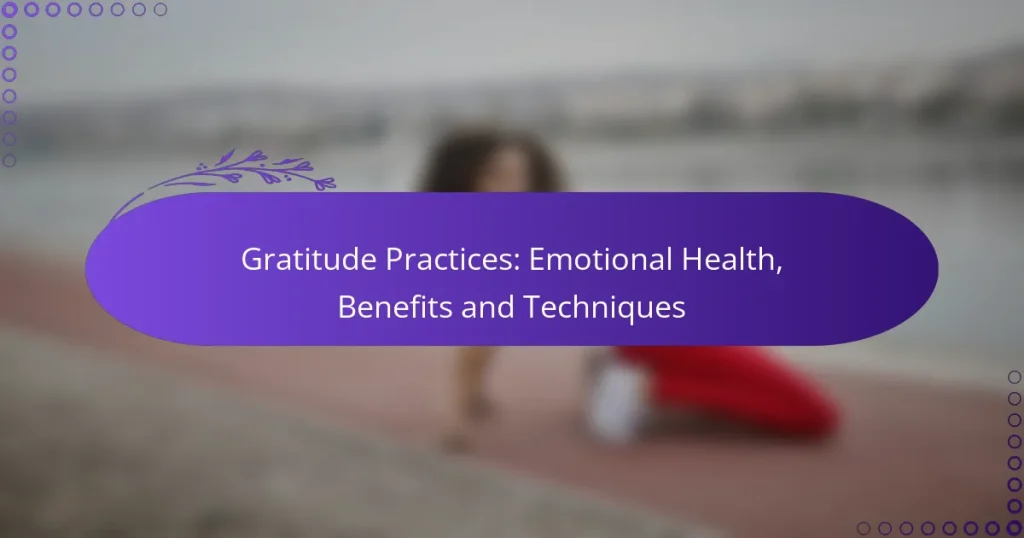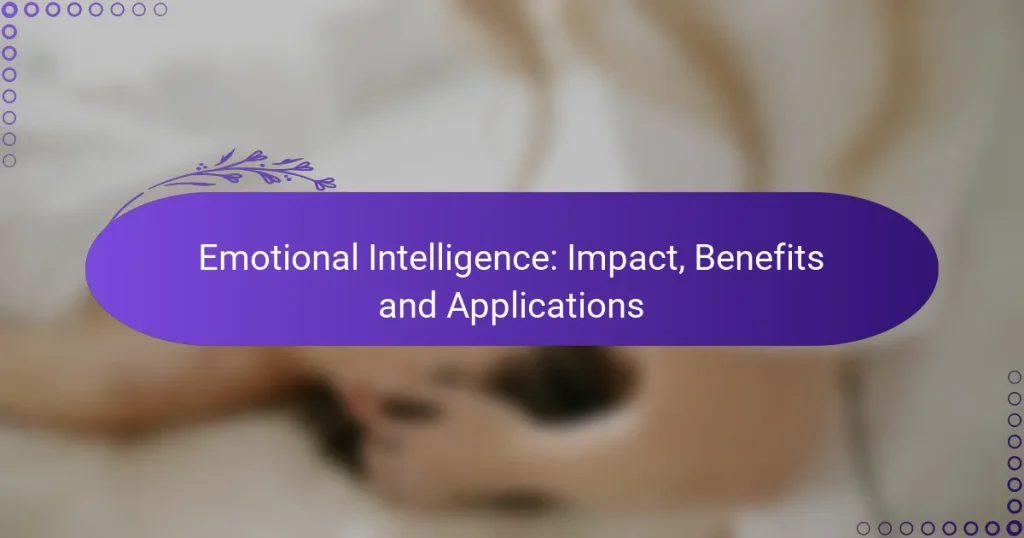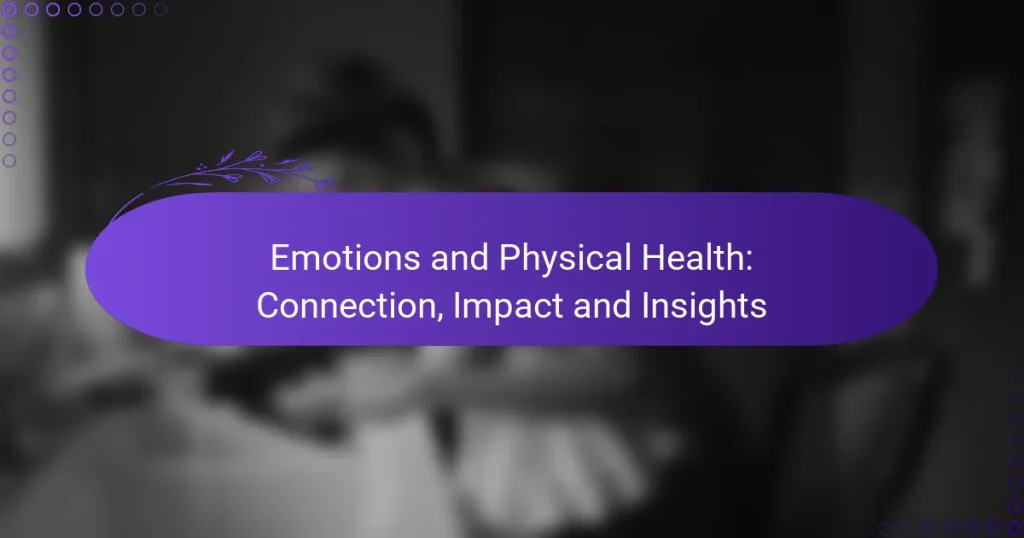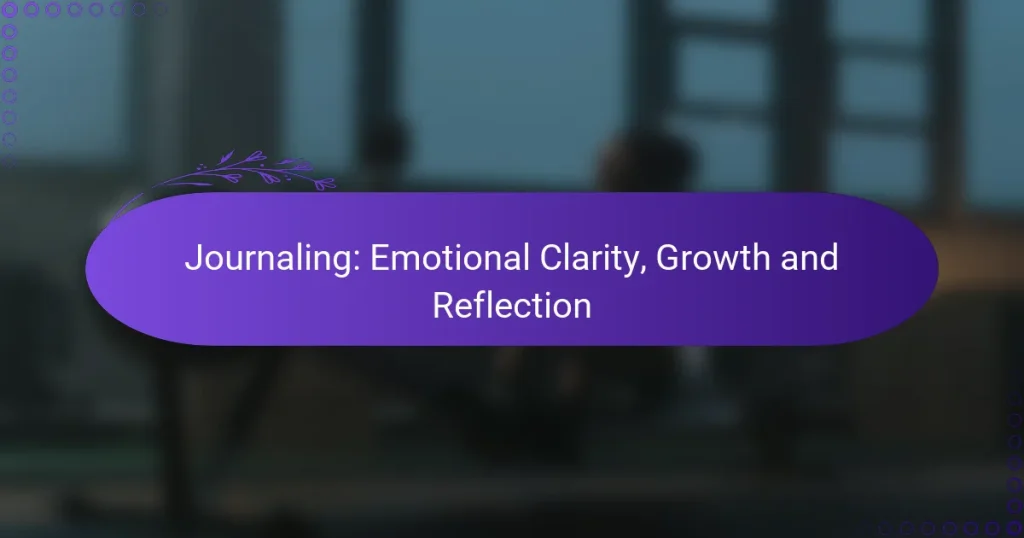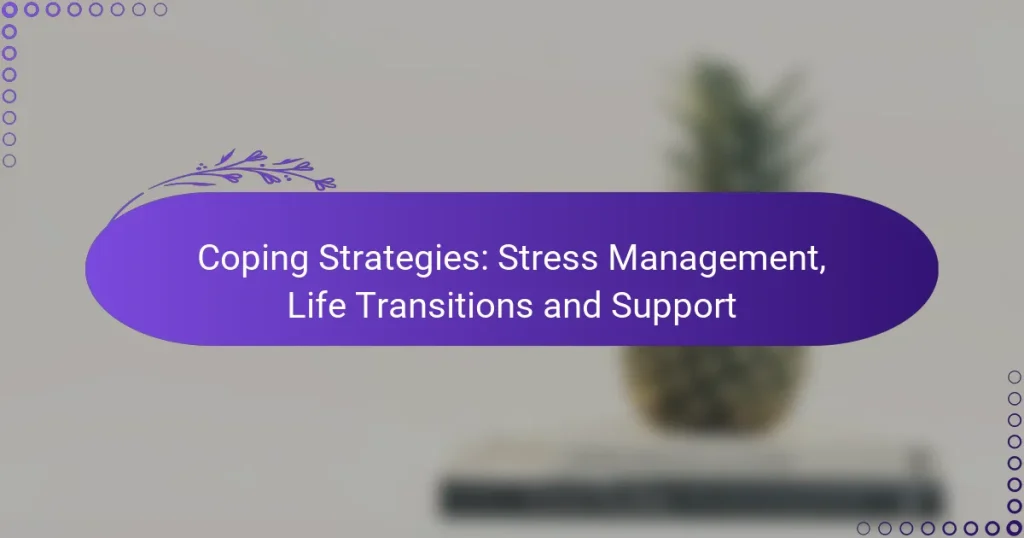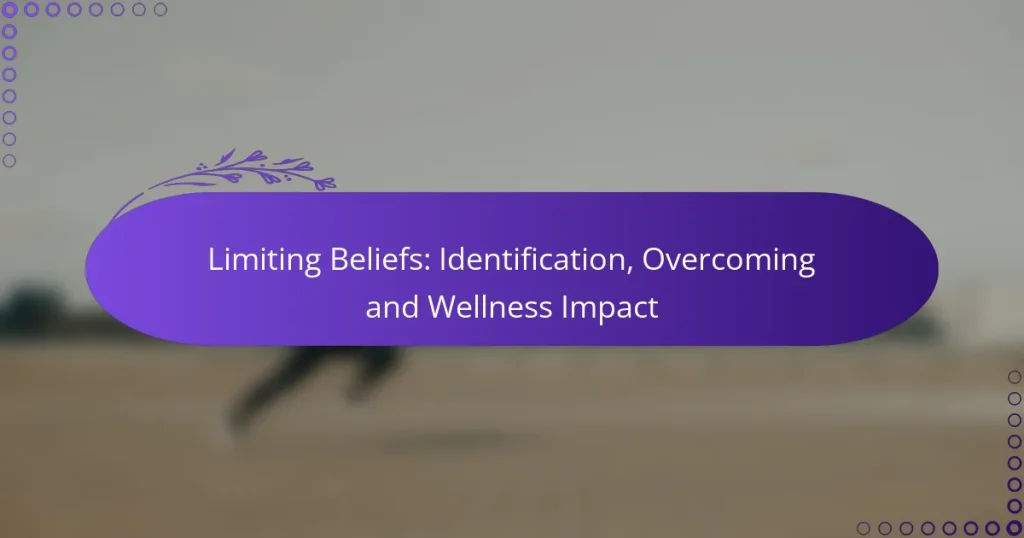Emotional wellbeing is a fundamental aspect of holistic coaching, which views the mind, body, and spirit as interconnected. By employing techniques such as meditation and mindfulness, this approach promotes personal growth and resilience, ultimately enhancing mental health and life satisfaction.
Gratitude Practices: Emotional Health, Benefits and Techniques
Emotional Intelligence: Impact, Benefits and Applications
Emotions and Physical Health: Connection, Impact and Insights
Journaling: Emotional Clarity, Growth and Reflection
Coping Strategies: Stress Management, Life Transitions and Support
Limiting Beliefs: Identification, Overcoming and Wellness Impact
How can holistic coaching improve emotional wellbeing?
Holistic coaching enhances emotional wellbeing by addressing the mind, body, and spirit as interconnected elements. This approach fosters personal growth, resilience, and a deeper understanding of one’s emotions, leading to improved mental health and overall life satisfaction.
Enhanced self-awareness
Enhanced self-awareness is a cornerstone of holistic coaching, enabling individuals to recognize their emotions, triggers, and patterns of behavior. By engaging in reflective practices such as journaling or mindfulness, clients can gain insights into their emotional responses and identify areas for growth.
Coaches often use tools like personality assessments or guided meditations to facilitate this process. Increased self-awareness can lead to better decision-making and healthier relationships, as individuals learn to navigate their emotions more effectively.
Stress reduction techniques
Holistic coaching incorporates various stress reduction techniques that promote emotional wellbeing. Methods such as deep breathing exercises, yoga, and meditation help clients manage stress and cultivate a sense of calm. These practices can be easily integrated into daily routines, allowing for consistent stress management.
Clients may also explore time management strategies or lifestyle changes to reduce stressors. Regular practice of these techniques can lead to significant improvements in emotional resilience and overall mental health.
Personalized support systems
Personalized support systems are vital in holistic coaching, as they provide tailored guidance based on individual needs and goals. Coaches work with clients to develop a network of support, which may include friends, family, or community resources, ensuring that clients have access to encouragement and accountability.
Additionally, coaches may recommend specific resources such as books, workshops, or online courses that align with the client’s emotional wellbeing journey. This personalized approach fosters a sense of belonging and empowerment, essential for maintaining emotional health over time.
What techniques are used in holistic coaching for emotional wellbeing?
Holistic coaching for emotional wellbeing employs various techniques that focus on the mind-body connection, aiming to enhance emotional health through comprehensive practices. Key methods include meditation, mindfulness, and breathwork, each offering unique benefits to help individuals manage stress and improve overall emotional resilience.
Meditation practices
Meditation practices in holistic coaching often involve techniques such as guided imagery, loving-kindness meditation, and body scan. These methods encourage relaxation, reduce anxiety, and promote self-awareness. Regular practice can lead to significant improvements in emotional regulation and mental clarity.
To start, set aside 10-20 minutes daily in a quiet space. Focus on your breath or a specific mantra to help center your thoughts. Over time, you may find that even short sessions can yield noticeable benefits.
Mindfulness exercises
Mindfulness exercises help individuals stay present and engaged in the moment, which can alleviate feelings of overwhelm and anxiety. Techniques include mindful eating, walking meditations, and simple breathing exercises that encourage awareness of thoughts and feelings without judgment.
Incorporate mindfulness into your daily routine by dedicating a few minutes to observe your surroundings or your sensations while eating. This practice can enhance emotional wellbeing by fostering a deeper connection to your experiences.
Breathwork methods
Breathwork methods involve various breathing techniques designed to promote relaxation and emotional release. Common approaches include diaphragmatic breathing, box breathing, and alternate nostril breathing. These methods can help reduce stress levels and improve emotional balance.
To practice diaphragmatic breathing, sit or lie down comfortably, place one hand on your chest and the other on your abdomen, and take deep, slow breaths, ensuring your abdomen rises more than your chest. Aim for 5-10 minutes of this practice daily to experience its calming effects.
What are the benefits of emotional wellbeing in holistic coaching?
Emotional wellbeing in holistic coaching enhances overall life satisfaction and personal growth. It fosters a balanced approach to mental, emotional, and physical health, leading to transformative changes in various aspects of life.
Improved mental health
Emotional wellbeing significantly contributes to improved mental health by reducing symptoms of anxiety and depression. Holistic coaching techniques, such as mindfulness and self-reflection, help individuals develop healthier coping mechanisms and a more positive outlook.
Practicing emotional awareness can lead to better stress management and a greater sense of control over one’s life. Regular check-ins with a coach can facilitate this process, allowing individuals to address emotional challenges proactively.
Stronger relationships
Emotional wellbeing enhances interpersonal relationships by fostering empathy and effective communication. When individuals are emotionally balanced, they are more likely to engage in healthy interactions, leading to deeper connections with family, friends, and colleagues.
Holistic coaching encourages active listening and emotional expression, which are key components of strong relationships. By understanding and managing their emotions, individuals can navigate conflicts more effectively and build trust with others.
Increased resilience
Building emotional wellbeing through holistic coaching increases resilience, enabling individuals to bounce back from setbacks more effectively. This resilience is cultivated by developing a positive mindset and adaptive coping strategies.
Coaching sessions often include goal-setting and visualization techniques that empower individuals to face challenges with confidence. By learning to view obstacles as opportunities for growth, clients can enhance their ability to persevere in difficult situations.
How to choose the right holistic coach for emotional wellbeing?
Choosing the right holistic coach for emotional wellbeing involves assessing their qualifications, coaching style, and feedback from previous clients. This ensures that the coach aligns with your personal needs and goals, fostering a supportive environment for growth.
Credentials and experience
When selecting a holistic coach, verify their credentials and relevant experience in emotional wellbeing. Look for certifications from recognized institutions and any specialized training in areas like mindfulness, emotional intelligence, or therapeutic techniques.
Experience matters; a coach with several years in practice may offer deeper insights and a more refined approach. Aim for coaches who have worked with diverse clients, as this indicates adaptability and a broader understanding of various emotional challenges.
Coaching style compatibility
Coaching styles can vary significantly, so it’s essential to find one that resonates with you. Some coaches may adopt a more directive approach, while others might focus on facilitating self-discovery through open-ended questions.
Consider scheduling an initial consultation to discuss their methods and philosophies. This meeting can help you gauge whether their approach aligns with your preferences and emotional needs.
Client testimonials
Client testimonials provide valuable insights into a coach’s effectiveness and approach. Look for reviews that highlight specific outcomes or experiences, as these can indicate how well the coach supports emotional wellbeing.
Seek testimonials from clients with similar goals or challenges to yours. This can help you assess whether the coach has a track record of success in areas relevant to your emotional growth.
What are the costs associated with holistic coaching?
The costs associated with holistic coaching can vary significantly based on factors such as location, the coach’s experience, and the type of services offered. Understanding these costs can help you make informed decisions about your investment in emotional wellbeing.
Session pricing
Individual session prices for holistic coaching typically range from $50 to $200 per hour. Factors influencing this pricing include the coach’s qualifications, the session’s length, and the specific techniques used. It’s advisable to inquire about any introductory rates or sliding scale options that may be available.
Package deals
Many holistic coaches offer package deals that provide a discount for purchasing multiple sessions upfront. For instance, a package of five sessions might cost between $200 and $800, depending on the coach’s pricing structure. This approach not only saves money but also encourages a commitment to the coaching process.
Insurance coverage options
Insurance coverage for holistic coaching varies widely by provider and policy. Some health insurance plans may cover certain types of coaching, particularly if they are related to mental health or wellness. It’s essential to check with your insurance company to understand what services are eligible for reimbursement and whether a referral from a healthcare provider is necessary.
What is the role of emotional intelligence in holistic coaching?
Emotional intelligence is crucial in holistic coaching as it enables coaches to understand and manage their own emotions while effectively recognizing and influencing the emotions of their clients. This skill fosters a supportive environment that promotes personal growth and well-being.
Understanding emotions
Understanding emotions involves recognizing and interpreting feelings in oneself and others. Coaches should be aware of various emotional states, such as joy, anger, or sadness, and how these can impact decision-making and behavior. This awareness allows for tailored coaching strategies that resonate with clients’ emotional experiences.
Coaches can enhance their understanding of emotions by engaging in reflective practices, such as journaling or mindfulness exercises. These activities help in identifying emotional triggers and responses, which can then be addressed during coaching sessions.
Empathy development
Empathy development is essential for building trust and rapport between the coach and client. By actively listening and validating clients’ feelings, coaches can create a safe space for open communication. This connection encourages clients to explore their emotions more deeply and facilitates transformative change.
To cultivate empathy, coaches can practice techniques such as mirroring body language, summarizing what clients say, and asking open-ended questions. These methods help in understanding clients’ perspectives and emotions, leading to more effective coaching outcomes.
